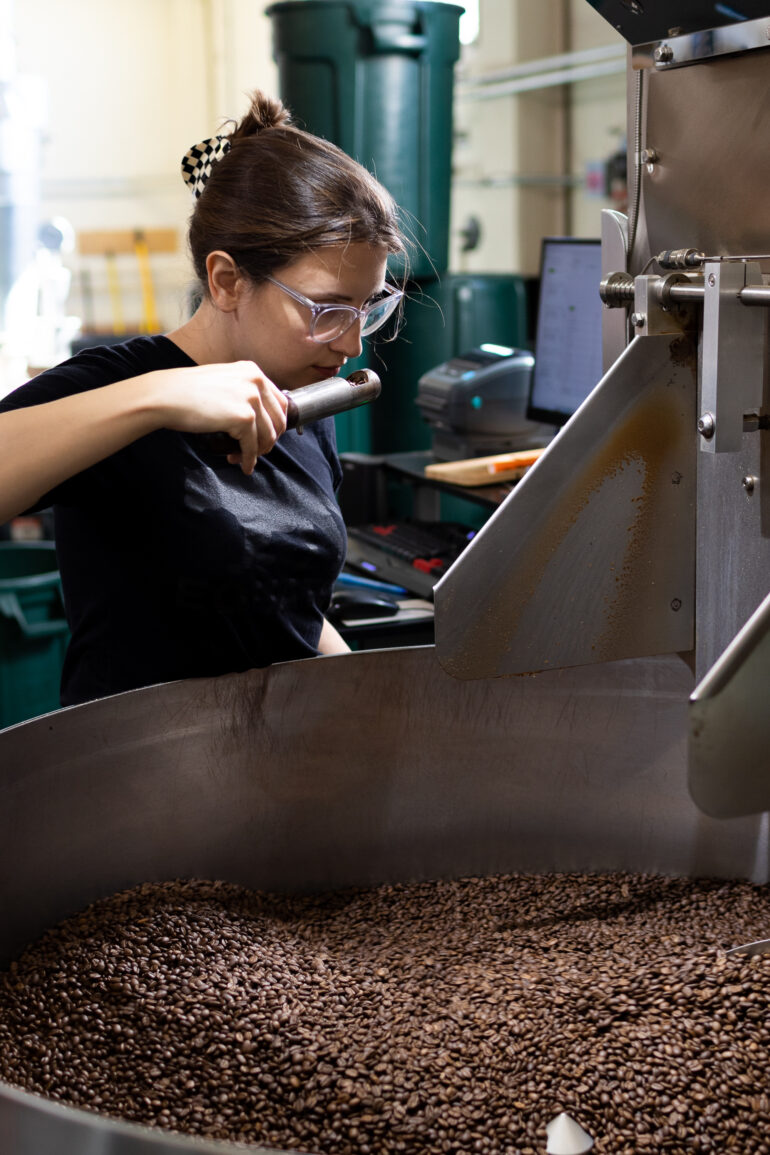Below, find a case study featuring Equator Coffees of Marin County, California.

Who They Are:
Equator Coffees was founded in 1995 by Helen Russell and Brooke McDonnell in a Marin County, CA garage. From the very beginning, their business made an obsessive commitment to roasting expertise, green coffee sourcing, sustainability, Fair Trade practices, and remarkable customer experience. They were the first California coffee roaster to achieve B Corp Certification.
Today, Equator operates on the retail and wholesale level with their own roasting facility and eleven retail locations throughout California from Marin County to Los Angeles. The company is women-owned, LGBTQ-founded, and dedicated to the promotion of progressive values through charity and volunteer work.
Equator was an early adapter of Loring Smart Roast technology. Their roasting facility houses the fourth Loring K35 Kestrel ever built as well as a newer Loring Peregrine S70.
The Situation:
From the very beginning, founders Russell and McDonnell were on a values-driven path largely guided by providing high-quality and ethically-sourced coffee to their customer base. When the business grew and necessitated equipment with higher capacity, they began researching roasters that would leave the smallest impact, both in space and on the environment.
Their roast volume also increased, requiring a roaster that could handle at least a half-bag of green coffee (35kg) per batch. Over time and through retail and wholesale expansion, that volume increased again to an additional full bag (70kg) per batch.
Most importantly, in order to align with their core values, they needed a solution that offered consistency and efficiency while reducing their environmental impact via lower natural gas usage and emissions.
“Equator has been using a Loring roaster since 2007; among the first roasters to adopt the new technology. Attracted to its energy efficiency, ease of use, and consistency, we installed a second, larger Loring in 2018. The two machines combined have drastically reduced Equator’s natural gas consumption, which has helped us achieve our environmental sustainability goals.”
Ted Stachura, Director of Coffee
The Solution:
At the time, Loring Smart Roast was a newer business offering an as-yet unheard-of solution – a roaster with an integrated burner that eliminated the need for an external afterburner and offered a smaller physical footprint than other similar-sized roasters. This was beneficial from a practical standpoint, as their facility in the San Francisco Bay Area has limited space for the volume they produce. A physically smaller machine made facility planning more versatile and the lack of afterburner reduced the amount of radiant heat in the warehouse.
With increased production and multiple locations, product consistency and efficiency were required to maintain customer satisfaction. Loring offered a machine with a high consistency between roasts regardless of the team member helming the machine thanks to the roaster’s ability to save profiles, which made training new roasters simple.
The ability to drag and drop roast profiles across different Loring machines made scaling to a full-bag roaster virtually painless. The greatest benefit, and the one most in line with Equator’s values, was the notable 80% reduction in carbon emissions and drastically reduced CO2 levels. All of these factors combined made scaling up to an additional Loring S70 Peregrine an easy decision for them.
“We roast 50 hours per week, 3 batches per hour, which means that how we roast matters. By using Loring Smart Roasters at our roastery, we’ve made a big impact.”
Equator Coffees 2023 Impact Report
The Results:
Equator is a high-volume macro roaster. They roast 50 hours per week and produce over 800,000 kilograms (over one million pounds) of roasted coffee per year as of 2023.
According to their 2022 and 2023 Impact Reports, they have reduced their carbon emissions by 80% per batch compared to using traditional drum roasters. The 2023 report also notes that their two Loring machines keep 261,495 pounds of CO2 out of the environment each year.
When roasting coffee in such high quantities for distribution in multiple locations, batch consistency is very important. Working with Loring’s convection-style roasting technology allows Equator a high level of control over the consistency of their coffees, maintaining their high standards for customer satisfaction. The ability to save and automate profiles makes it simple to cross-train new roasters and switch between machines without significant downtime.